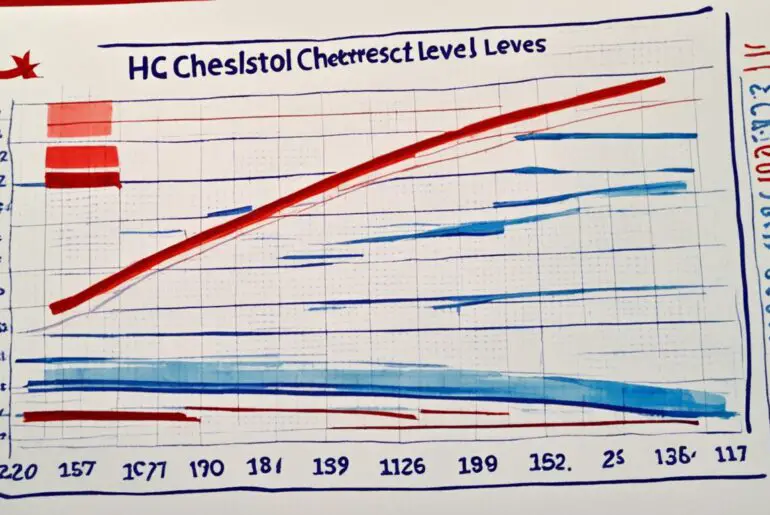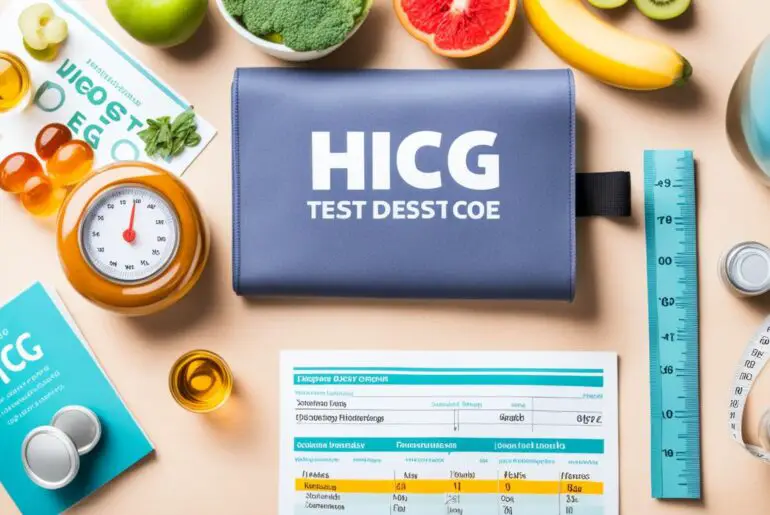When it comes to weight loss, people are constantly exploring new diets and methods to shed those extra pounds. One program that has gained popularity is the HCG diet, which involves severe calorie restriction and the use of HCG supplements. But have you ever wondered how this diet could impact your heart rate?
The HCG diet has raised concerns among healthcare professionals regarding its effects on cardiac health. With such severe calorie restriction, there is a worry that it may lead to irregular heartbeats and an increased risk of blood clots. As a journalist, I’ve delved into this topic to provide you with the information you need to make informed decisions about your health and weight loss journey.
In this article, we will delve into the potential impact of the HCG diet on heart rate and cardiac health. We’ll explore the risks and side effects of the diet, the lack of scientific support, and the importance of prioritizing safe and evidence-based weight loss methods. So, if you’ve ever wondered whether the HCG diet can affect your heart rate, keep reading to uncover the answers.
Key Takeaways:
- The HCG diet is a weight loss program that involves severe calorie restriction and the use of HCG supplements.
- The FDA has deemed over-the-counter HCG weight-loss products illegal and ineffective for weight loss.
- The HCG diet’s severe calorie restriction may pose risks to cardiac health, including irregular heartbeat and an increased risk of blood clots.
- The diet lacks scientific evidence supporting its efficacy for weight loss beyond calorie restriction alone.
- It is crucial to prioritize safe and sustainable weight loss approaches and consult with healthcare professionals for personalized guidance.
Potential Risks and Side Effects of the HCG Diet
The HCG diet is often promoted as a quick and effective weight loss solution. However, it is crucial to understand the potential risks and side effects associated with this diet program. Severe calorie restriction, one of the key components of the HCG diet, can have detrimental effects on your health.
One of the potential risks of the HCG diet is the formation of gallstones. When your body is deprived of an adequate amount of calories, it starts breaking down fat rapidly, leading to the release of cholesterol into the bile. This excess cholesterol can crystallize and form gallstones, which can cause intense pain and require surgical intervention.
Electrolyte imbalances are another concern with the HCG diet. By severely restricting your calorie intake, you may not be consuming enough essential nutrients and electrolytes. This imbalance can disrupt the normal functioning of your body, leading to weakness, fatigue, and even heart problems.
Speaking of the heart, an irregular heartbeat is a potential side effect of the HCG diet. The extreme calorie restriction can put stress on your cardiovascular system, causing your heart to beat erratically. This can be dangerous, especially for individuals with pre-existing heart conditions.
Other side effects that may occur during the HCG diet include fatigue, irritability, restlessness, and depression. These can be attributed to the drastic reduction in calorie intake and the hormonal changes that accompany such a low-calorie diet.
Fluid buildup, or edema, is another potential side effect of the HCG diet. When you consume very few calories, your body may retain water in an attempt to protect itself. This can lead to swelling in the limbs and other areas of the body, causing discomfort and a distorted appearance.
One concerning aspect of the HCG diet is the potential increase in cancer risk associated with HCG weight-loss products. While more research is needed to establish a definitive link, it is essential to consider these risks and prioritize your long-term health.
“The HCG diet carries several potential risks and side effects, including gallstone formation, electrolyte imbalances, irregular heartbeat, fatigue, and fluid buildup. There is also concern about the potential increase in cancer risk.”
In order to ensure your safety, it is crucial to consult with a healthcare professional before starting any weight loss program, including the HCG diet. They can assess your individual health conditions and risks, provide personalized guidance, and recommend safe and effective weight loss strategies.
| Potential Risks of the HCG Diet | Side Effects of the HCG Diet |
|---|---|
| Gallstone formation | Fatigue |
| Electrolyte imbalances | Irritability |
| Irregular heartbeat | Restlessness |
| Increased cancer risk (potential) | Depression |
| Fluid buildup (edema) | |
| Swelling of the breasts in males (gynecomastia) |
It is important to prioritize your health and well-being when considering weight loss programs. Explore safer and more sustainable alternatives that focus on balanced nutrition, regular exercise, and long-term lifestyle changes. Remember, your journey to a healthier you should always be approached with caution and professional guidance.
The Lack of Scientific Support for HCG Diet
When it comes to the effectiveness of the HCG diet for weight loss, there is a lack of scientific evidence to support its claims. The FDA, in particular, states that there is no substantial evidence that HCG increases weight loss beyond what can be achieved through calorie restriction alone. In other words, the weight loss experienced on the HCG diet is primarily due to the severe calorie restriction it entails, rather than any specific effect of HCG.
Scientific studies conducted on the HCG diet have provided inconclusive or conflicting results, further highlighting the need for more research in this area. While some studies have reported modest weight loss during the HCG diet, others have found no significant difference from a placebo or control group. This lack of consistent findings raises doubts about the reliability and effectiveness of the HCG diet.
It is essential to rely on evidence-based approaches to weight loss. Instead of following fad diets like the HCG diet, individuals should consider more well-established methods backed by scientific research and healthcare professionals.
“The lack of scientific evidence supporting the HCG diet brings into question its effectiveness and reliability as a weight loss method.” – Dr. Emily Thompson, Nutrition Specialist
The Importance of Well-Designed Scientific Studies
For any weight loss program, including the HCG diet, it is crucial to have rigorous scientific studies that examine the program’s efficacy, safety, and long-term effects. Well-designed studies should include large sample sizes, control groups, and reliable measures of weight loss and other health parameters.
Without robust scientific evidence, it is challenging to ascertain the true benefits and potential risks of the HCG diet. Without proper research, claims about the effectiveness of the HCG diet remain largely anecdotal and lack the necessary scientific backing.
The Need for Further Research
In order to provide consumers with accurate information, more research is needed to evaluate the effectiveness of the HCG diet. Specifically, future studies should explore various aspects, such as the impacts of HCG on metabolism, the mechanisms behind the claimed weight loss benefits, and potential long-term effects on overall health.
Through well-designed scientific studies, we can gain a better understanding of the HCG diet and its potential role in weight management. Only then can evidence-based recommendations be made to individuals seeking safe and effective weight loss strategies.
Potential Health Risks of Very Low-Calorie Diets

Very low-calorie diets, such as the HCG diet, can have significant health risks that should not be overlooked. These diets, which involve severe calorie restriction, may lead to various complications that can negatively impact your overall well-being.
One of the potential risks of very low-calorie diets is the formation of gallstones. When your body doesn’t receive enough fat, it may not properly metabolize bile, leading to the development of gallstones. These small, solid deposits can cause pain and discomfort in the gallbladder.
Another concern is the potential for electrolyte imbalances. When you severely restrict your calorie intake, you may not be getting enough essential nutrients, including electrolytes like sodium, potassium, and calcium. These electrolytes are essential for proper muscle and nerve function, and imbalances can lead to weakness, fatigue, and even heart problems.
Severe calorie restriction also increases the risk of developing an irregular heartbeat, known as arrhythmia. When your body is deprived of adequate energy from food, it can disrupt the electrical signals that regulate your heart’s rhythm. This can have serious consequences and may require medical intervention.
Nutritional deficiencies are another potential health risk of very low-calorie diets. When you drastically reduce your caloric intake, your body may not be receiving enough vitamins, minerals, and other vital nutrients. This can lead to weakness, fatigue, hair loss, and compromised immune function.
Muscle loss is also a common side effect of extremely low-calorie diets. Your body may turn to breaking down muscle tissue for energy since it doesn’t have enough calories from food. This can result in a loss of strength, decreased metabolism, and a less toned physique.
Hormonal imbalances are yet another concern with very low-calorie diets. Your hormones play a crucial role in regulating various bodily functions, including metabolism and appetite. Severe calorie restriction can disrupt these hormonal processes and potentially lead to irregular menstrual cycles in women and decreased libido in both men and women.
In conclusion, while very low-calorie diets may appear to offer quick weight loss results, they come with significant health risks. From gallstones to electrolyte imbalances, irregular heartbeats to nutritional deficiencies, these diets can have long-term consequences for your well-being. It is crucial to prioritize balanced and sustainable approaches to weight loss that focus on overall health and adequate nutrition.
FDA’s Warnings and Regulations Regarding HCG Diet
The FDA has been diligent in highlighting the risks associated with the HCG diet and implementing regulations to protect consumers. The FDA warns against the use of over-the-counter HCG weight-loss products, deeming them illegal and ineffective for weight loss purposes. It is essential to be aware of these warnings to prioritize your health and well-being.
According to the FDA, HCG is a prescription medication approved for treating fertility issues, not for weight loss. Companies selling over-the-counter HCG products are breaking the law. These products have not undergone rigorous testing for safety and efficacy and may pose significant risks to your health.
By adhering to FDA regulations and avoiding illegal HCG diet products, you can safeguard yourself from potential harm. It is crucial to consult with healthcare professionals and pursue safe, legal weight loss methods to achieve your goals.
Remember, your health is paramount, and choosing to follow FDA guidance ensures that you make informed decisions about your weight loss journey.
“It is essential to be aware of FDA warnings to prioritize your health and well-being.”
| FDA Warnings on HCG Diet | FDA Regulations for HCG Diet Products | Illegal HCG Diet Products |
|---|---|---|
| Warning against over-the-counter HCG weight-loss products | Deeming these products illegal and ineffective | Highlighting the importance of legal and safe weight loss methods |
| Emphasizing the need for FDA-approved prescription HCG for fertility purposes only | Companies selling over-the-counter HCG products are breaking the law | No quality control or safety testing on illegal HCG diet products |
| Seeking guidance from healthcare professionals for safe weight loss | Pursuing safe and legal weight loss methods | Avoiding potential health risks associated with illegal HCG diet products |
Safe and Sustainable Weight Loss Approaches
Rather than resorting to extreme diets like the HCG diet, there are safer and more sustainable methods for weight loss. It is essential to prioritize long-term health and well-being by adopting healthy and balanced strategies that promote gradual and sustainable weight loss.
Achieving safe and sustainable weight loss involves:
- Adopting a Balanced Diet: Focus on consuming a variety of nutrient-dense foods that provide essential vitamins, minerals, and macronutrients. A balanced diet should include a combination of fruits, vegetables, whole grains, lean proteins, and healthy fats. Strive for portion control and mindful eating to create a calorie deficit without sacrificing vital nutrition.
- Incorporating Regular Physical Activity: Engage in regular exercise to boost metabolism, burn calories, and improve overall fitness. Choose activities that you enjoy, such as walking, jogging, cycling, swimming, or participating in group fitness classes. Aim for at least 150 minutes of moderate aerobic activity or 75 minutes of vigorous aerobic activity per week, along with strength training exercises.
- Seeking Support from Healthcare Professionals: Consult with healthcare professionals or registered dietitians who can provide personalized guidance and support throughout your weight loss journey. They can help develop an individualized plan tailored to your specific needs, monitor your progress, and address any challenges or concerns you may have.
Benefits of safe and sustainable weight loss methods include:
- Better Overall Health: By adopting a balanced diet and engaging in regular physical activity, you can improve your overall health and reduce the risk of chronic conditions such as heart disease, diabetes, and obesity-related cancers.
- Gradual and Lasting Results: Safe weight loss is typically achieved through slow and steady progress, leading to more sustainable results. Rapid weight loss often results in muscle loss and can trigger metabolic adaptations that make it difficult to maintain long-term success.
- Improved Mood and Well-being: Healthy weight loss strategies not only benefit your physical health but also contribute to enhanced mental well-being. Regular exercise can help reduce stress, improve mood, and increase self-confidence.
Remember, the journey to safe and sustainable weight loss is unique to each individual. It is important to consult with healthcare professionals for personalized advice and make informed decisions that prioritize your long-term health and well-being.
| Safe and Sustainable Weight Loss Approaches | Benefits |
|---|---|
| Adopting a Balanced Diet | Better overall health |
| Incorporating Regular Physical Activity | Gradual and lasting results |
| Seeking Support from Healthcare Professionals | Improved mood and well-being |
The Role of Healthcare Professionals in Weight Loss Journey

When it comes to embarking on a weight loss journey, consulting healthcare professionals is of utmost importance. Seeking their guidance and expertise can make all the difference in achieving your goals safely and effectively. Healthcare professionals provide personalized advice tailored to your individual needs, helping you navigate the challenges and complexities of weight loss.
Medical guidance is crucial during dieting, especially when considering programs like the HCG diet. Healthcare professionals can assess your health conditions and risks, ensuring that the chosen weight loss method aligns with your overall well-being. They can provide you with evidence-based strategies that promote safe and sustainable weight loss.
One of the key advantages of consulting healthcare professionals is their ability to monitor your progress. They can keep track of your weight loss journey, monitor any potential side effects or complications, and make adjustments as necessary. This regular supervision ensures that you are on the right track and reduces the risk of adverse health outcomes.
Furthermore, healthcare professionals have access to valuable resources and tools that can enhance your weight loss experience. They can provide you with educational materials, meal plans, and exercise recommendations tailored to your specific needs and preferences. With their support, you can make informed decisions and implement healthy habits that will contribute to long-term success.
“Consulting healthcare professionals for weight loss not only provides you with expert guidance but also offers a crucial support system. They are your partners in your journey towards a healthier and fitter lifestyle.”
Weight loss can have a profound impact on your overall health, and it is essential to prioritize professional advice. By consulting with healthcare professionals, you benefit from their experience, knowledge, and evidence-based approach to weight loss. Together, you can create a personalized plan that aligns with your goals and sets you up for long-term success.
Remember, your health is your most valuable asset. Don’t hesitate to reach out to healthcare professionals for the support and guidance you need to achieve your weight loss goals while safeguarding your well-being.
Special Considerations and Risks for Specific Populations
When considering the HCG diet, it is important to be aware of the specific risks and considerations for certain populations, including pregnant and breastfeeding women, as well as children and the elderly. These individuals may be more vulnerable to the potential dangers associated with the HCG diet.
Risks of HCG Diet for Pregnant and Breastfeeding Women
Pregnant and breastfeeding women should avoid the HCG diet due to the significant risks it poses to both the mother and the baby. Severe calorie restriction may lead to nutrient deficiencies, which can affect the baby’s development and overall health. Moreover, hormonal changes during pregnancy and breastfeeding require adequate nutrition for the well-being of both the mother and the child. It is essential for pregnant and breastfeeding women to prioritize a balanced diet that supports optimal nutrition and consult healthcare professionals for appropriate dietary guidance.
HCG Diet Risks for Children and Elderly
The HCG diet is not recommended for children and the elderly due to their unique nutritional needs and vulnerabilities. Severe calorie restriction can negatively impact growth and development in children, leading to nutrient deficiencies and potential long-term consequences. In the case of the elderly, the HCG diet may exacerbate existing health conditions and increase the risk of complications. It is crucial for children and the elderly to follow age-appropriate dietary guidelines and consult with healthcare professionals for safe weight management strategies.
HCG Diet and Cancer Risk
There is growing concern about the potential link between the HCG diet and an increased risk of cancer. Some studies have suggested that long-term use of HCG weight-loss products may promote the growth of certain types of cancer cells. However, further research is needed to fully understand the relationship between the HCG diet and cancer risk. In the meantime, it is prudent to prioritize cancer prevention and follow evidence-based approaches to weight loss that prioritize overall health and well-being.
The Importance of Prioritizing Safe and Evidence-Based Weight Loss Methods
When it comes to achieving our weight loss goals, it is important to prioritize safe and evidence-based approaches that promote both physical health and overall well-being. While quick fixes and extreme diets may promise rapid results, they often come with risks and potential harm to our bodies.
The HCG diet, for example, involves severe calorie restriction and the use of unapproved HCG weight-loss products. This approach not only poses risks to our cardiac health but also lacks scientific support and is not recommended by healthcare professionals. Instead, we should focus on safe weight loss approaches that prioritize balanced nutrition, regular physical activity, and long-term sustainable changes.
By adopting a balanced diet that provides adequate nutrition and creating a calorie deficit through a healthy eating plan, we can achieve weight loss in a sustainable manner. Regular physical activity not only supports weight loss but also improves cardiovascular health and boosts overall well-being. Consulting with healthcare professionals is crucial for personalized guidance and support on our weight loss journey, ensuring that we make informed decisions based on scientific evidence.
Remember, the journey to a healthier weight is not just about shedding pounds but also about improving our health and well-being. By choosing safe and evidence-based weight loss methods, we can achieve sustainable results and set ourselves up for long-term success.
FAQ
Can the HCG diet affect heart rate?
Yes, the HCG diet can potentially affect heart rate. Severe calorie restriction and the use of unapproved HCG weight-loss products can pose risks to cardiac health, including irregular heartbeat. It is important to prioritize safe and sustainable weight loss methods.
What are the potential risks and side effects of the HCG diet?
The potential risks and side effects of the HCG diet include gallstone formation, electrolyte imbalances, irregular heartbeat, fatigue, irritability, restlessness, depression, fluid buildup (edema), and swelling of the breasts in males (gynecomastia). It is crucial to prioritize safety and consult with healthcare professionals before embarking on any weight loss program.
Is there scientific support for the HCG diet?
No, there is a lack of scientific evidence supporting the efficacy of the HCG diet for weight loss. The FDA states that there is no substantial evidence that HCG increases weight loss beyond what can be achieved through calorie restriction alone. It is important to rely on evidence-based approaches to weight loss and consult with healthcare professionals for personalized guidance.
What are the potential health risks of very low-calorie diets like the HCG diet?
Very low-calorie diets, such as the HCG diet, pose potential health risks. These include gallstone formation, electrolyte imbalances, irregular heartbeat, nutritional deficiencies, muscle loss, and hormonal imbalances. Without proper medical supervision, these diets can be dangerous and have long-term health consequences. It is crucial to adopt balanced and sustainable approaches to weight loss that prioritize overall health and well-being.
What are the FDA’s warnings and regulations regarding the HCG diet?
The FDA advises consumers to avoid over-the-counter HCG weight-loss products, as they are deemed illegal and ineffective. HCG is a prescription medication approved for treating fertility issues but not for weight loss. Companies selling over-the-counter HCG products are breaking the law. It is important to be aware of FDA recommendations and seek guidance from healthcare professionals for safe and legal weight loss methods.
What are safe and sustainable weight loss approaches?
Rather than resorting to extreme diets like the HCG diet, safer and more sustainable methods for weight loss include adopting a balanced diet that provides adequate nutrition while creating a calorie deficit, engaging in regular physical activity, and seeking support from healthcare professionals or registered dietitians. Sustainable weight loss focuses on long-term lifestyle changes rather than short-term restrictive diets.
What is the role of healthcare professionals in the weight loss journey?
It is crucial to consult with healthcare professionals before starting any weight loss program, including the HCG diet. Healthcare professionals can provide personalized guidance, assess individual health conditions and risks, and recommend safe and effective weight loss strategies. They can also monitor and address any potential side effects or complications that may arise during the weight loss journey.
Are there special considerations and risks for specific populations?
Yes, specific populations, such as pregnant and breastfeeding women, as well as children and the elderly, are at higher risk when considering the HCG diet. These individuals may experience severe consequences due to mineral imbalances, inadequate nutrition, and hormonal changes. Moreover, there is evidence suggesting a potential increase in cancer risk associated with the HCG diet. It is vital to prioritize the health and well-being of these populations and avoid potentially harmful diet practices.
Why is it important to prioritize safe and evidence-based weight loss methods?
The HCG diet poses risks to cardiac health and overall well-being due to severe calorie restriction and the use of unapproved HCG weight-loss products. It lacks scientific support and is not recommended by healthcare professionals. It is crucial to prioritize safe and evidence-based weight loss methods that focus on balanced nutrition, regular physical activity, and long-term sustainable changes. Consultation with healthcare professionals is vital for personalized guidance and support on the weight loss journey.




